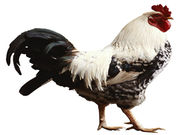Virus spread via respiratory droplets in animal study; neuraminidase inhibitors showed limited efficacy
FRIDAY, Oct. 20, 2017 (HealthDay News) — A highly pathogenic H7N9 avian influenza variant has evolved and now has the potential to cause a pandemic, according to a study published online Oct. 19 in Cell Host & Microbe.
Masaki Imai, from the University of Tokyo, and colleagues compared a low-pathogenic H7N9 virus with a highly pathogenic isolate and two of its variants that represent neuraminidase inhibitor-sensitive and -resistant subpopulations detected within the isolate.
The researchers found that the highly pathogenic H7N9 viruses replicated efficiently in mice, ferrets, and nonhuman primates. These viruses were more pathogenic in mice and ferrets than the low-pathogenic H7N9 virus was, with the exception of the neuraminidase inhibitor-resistant virus, which had mild to moderate attenuation. Among ferrets, all viruses were transmitted via respiratory droplets. The neuraminidase-sensitive variant killed several of the infected and exposed animals. In vivo, neuraminidase inhibitors showed limited effectiveness against these viruses, but the viruses were susceptible to a polymerase inhibitor.
“These results suggest that the highly pathogenic H7N9 virus has pandemic potential and should be closely monitored,” conclude the authors.
Several authors disclosed financial ties to pharmaceutical companies, including Toyama Chemical Co. Ltd. and Daiichi Sankyo Inc., which provided study medications.
Copyright © 2017 HealthDay. All rights reserved.








